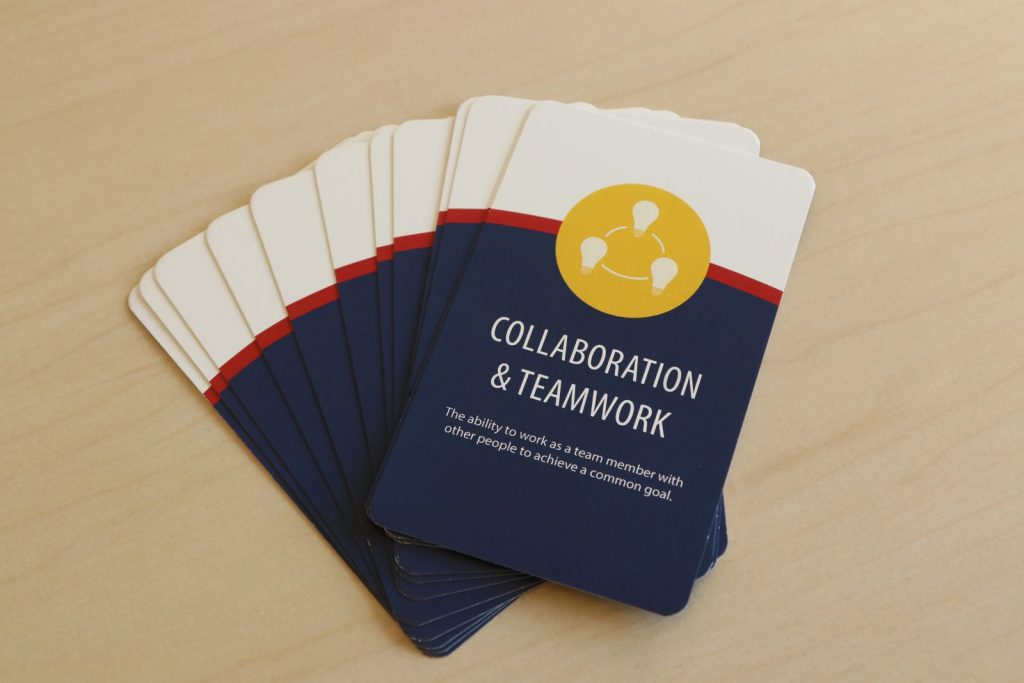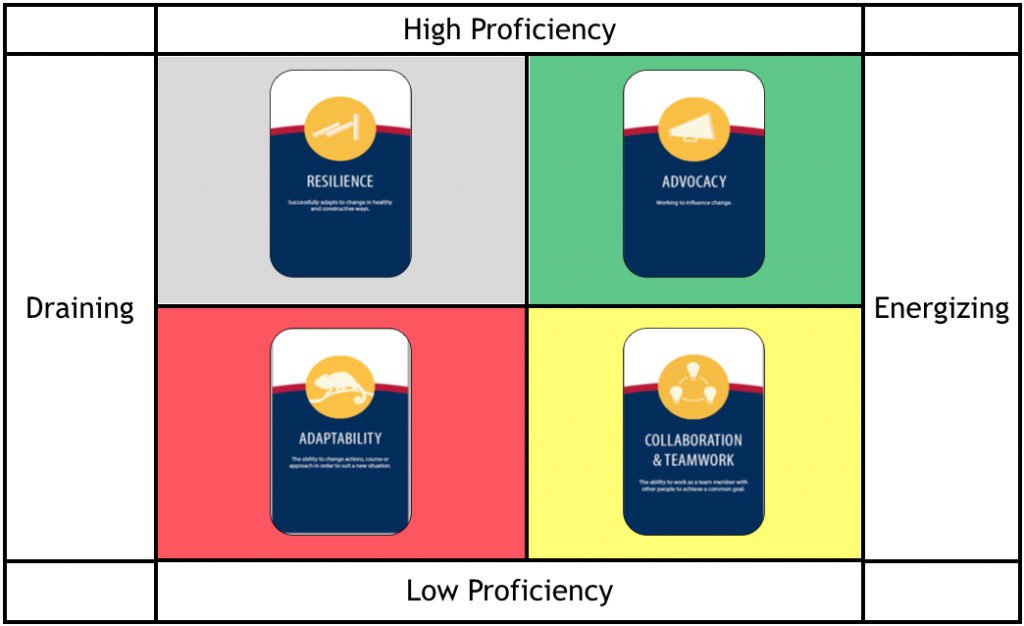
Career Briefs
October 6, 2020
Making career development ‘stick’ in K-12
October 6, 2020Queen’s University card sort and mapping activities can help students acknowledge and articulate their skills with confidence
Carli Fink

The role of skills awareness
The foundation of building a career is understanding the skills required to succeed in a given field and how these align with one’s own strengths. Communicating one’s value to a prospective employer is the ticket into the labour market. Reflection helps one become aware of their own strengths and competencies, enabling them to then articulate those assets and how they align with a given industry’s or employer’s needs.
A need for greater skills awareness is common among post-secondary students: despite their numerous achievements, many struggle to explain what they bring to the table beyond a list of past job and volunteer titles. Some do not connect their experience as a swim instructor to their strong communication skills, or realize that they are adaptable and culturally competent thanks to their experience living in two countries. Therein lies the “gap” — the skills are not absent, so much as unacknowledged and unarticulated. Those who can speak about their skills with clarity and confidence are able to demonstrate their value to prospective employers.
Read more from CareerWise
Helping students connect to the three worlds during their COVID-19 job search
We need to provide students with space for self-reflection
Laurier certificate connects volunteerism to students’ personal and professional development
Bridging the gap
Reflection is a career superpower and, when it comes to skills, flexing this muscle gives individuals the ability to identify and share their strengths. At Queen’s University, we have created a web of supports to help students with skills awareness and articulation, including: Skills Cards, Experiential Learning WrapAround and Major Maps.
While reflecting on skills is important, it can be a challenging undertaking. We decided to create a hands-on activity to help make this essential activity more engaging. The Queen’s Skills Cards are an innovative card sort based on the Queen’s Learning Outcomes Framework and employer data on desired skills. The cards name and define common transferrable skills, break each skill into components and provide an example of what that skill looks like in action. These cards help students identify and describe their skills, which boosts their confidence and provides a clearer sense of how different roles suit their strengths. The interactive and fun resource was designed as a physical deck of cards for career counsellors to use in appointments and workshops with students. Our hands-on resource has had to adapt to the COVID-19 times – a virtual version is also available. Guides for career practitioners at other institutions who wish to use the Queen’s Skills Cards or create their own institution-specific set are forthcoming.
We’ve created a variety of exercises that advisors can lead students through using the Queen’s Skills Cards. “You’ve Got Skills!” asks students to sort the cards by their proficiency, and then by the impact of each skill on their energy – that is, whether they find it energizing or draining to use that skill. An advisor can probe students to help them make meaning of their results: what kinds of jobs might rely on the skills they have identified as both high proficiency and energizing? How might they further develop the skills that feed their energy, but at which they are not yet proficient? A graph is also available so that students can plot their skills and see patterns more easily.

Queen’s Skills Cards. (Images courtesy of Queen’s University)
Another activity, “Getting What You Need to Succeed,” asks students to sort the skills by their relevance to a particular industry or job posting of interest. The student and advisor can then discuss whether the student has the skills they have identified as necessary. If the student believes they do possess those skills, the conversation can move toward finding examples to emphasize in their application or in an interview. If the student lacks one or more key skills, the advisor can help them find opportunities to develop those skills.
Update: The Queen’s Skills Cards won a 2020 CACEE Innovation in Student Engagement award as a hands-on skills assessment exercise to help students identify and articulate their skills. Once the pandemic hit, it was clear an online version was needed – it’s hard to use a deck of cards when all appointments and workshops are remote. The new Online Skills Sorter and Facilitator Guide are now available and accessible to anyone.
The Queen’s Skills Cards are now being used within other skill-building and skill-reflection activities. For instance, students can engage in skills conversations through the Experiential Learning WrapAround. The EL WrapAround provides training for university staff and faculty who supervise student employees or volunteers, with the goal of supervisors facilitating their students’ reflection at strategic points within the arc of these positions. At the beginning, middle and end of their students’ roles, supervisors lead their students in an intentional, supportive conversation about what skills they hope to build and how they can do so. A standard form centred on a short list of key skills helps supervisors focus and make the discussion concrete.
Finally, the Major Maps (careers.queensu.ca/majormaps) and Grad Maps (careers.queensu.ca/gradmaps) allow students to see a list of skills they can develop through each major available at Queen’s. The maps also outline the range of career-building experiences available within each of these programs of study. Prospective students as well as first-year students in general arts, science and engineering enjoy using the maps to evaluate how different majors will prepare them to achieve their career goals. Each map has a list of the skills developed in that particular major – these lists provide students with a starting point for talking about the skills and knowledge developed in their program, and how these differ from the outcomes of other programs.
Conclusion
Skills reflection and articulation are superpowers critical to finding a path that suits one’s strengths and in conducting an effective job search. As society enters a new era – one in which opportunities to gain experience in certain fields may be more limited – it is essential that students and recent graduates be able to explain their strengths and provide evidence of their transferability, ideally in language that is meaningful across industries. The fact that students and recent graduates have skills doesn’t mean they automatically know what to call them, how to describe their development or where in the labour market these skills might prove valuable. To foster this knowledge and bolster their confidence, students and recent graduates must intentionally reflect on their experiences. In helping individuals harness the power of their past experiences, reflection provides the key required to unlock the doors of future opportunities.
Carli Fink is a Career Counsellor at Queen’s University in Kingston, ON, and led the launch of the new Queen’s Skills Cards, which were recognized with a 2020 CACEE Excellence in Innovation: Student Engagement Award.


